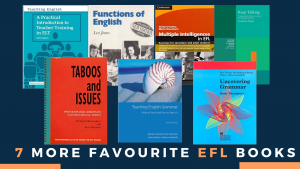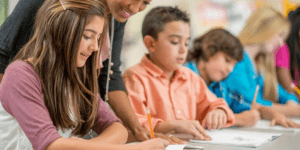By Vasiliki Lismani
“Sharing is caring”.
You might think “What a cliché!” but, as teachers we know that this is (or at least should be) our motto. Sharing is, by all means, caring first and foremost about our students; is it possible that it’s also caring about ourselves and our colleagues?
Is it possible that teachers care so much about their students that they forget to care about themselves as educators?
These ideas have been on my mind for quite a long time along with the certainty that if we share things with ourselves and our colleagues, then all the benefits will return to our students. However, sharing with others makes perfect sense but “sharing” with ourselves? What we do, what we think as educators ought to be well thought out and planned, an integral part of our teaching-selves which stems from our teaching value system, our theoretical background combined with our hands-on experience. However, when we take all the above for granted, we are at risk of not questioning our practices; we adopt a rather repetitive and habitual attitude which has nothing to do with a constant argument with ourselves about our daily decisions in class.
I had been trying to find a more proper word to describe my point of view about this sharing – with – ourselves approach when I started studying about the concept of reflection and reflective teaching preparing my presentation for 25th TESOL Macedonia Thrace Annual Conference representing TESOL GREECE last March. Then, I remembered Confucius talking about the three paths to wisdom where he credited reflection to be the noblest.
Let me present you with a very usual scenario: after a long day with classes after classes, we sometimes meet with friends and start exchanging (“sharing”) incidents from work. It’s more than catching up with each others’ news. Quite often we have the inner need to share things with friends and family; it is easier to deal with a situation looking back with a clearer eye. Accordingly, reflection can take place after a long day in class or after a stressful week when we start to scrutinize and analyze our experiences and think of what we did, how we did it and think about the effectiveness of our choices and the kind of influence these had to our students.
Sharing with ourselves: what to reflect on
1. Our teaching belief system
From time to time take a minute to think about your teaching belief system and how this has been formulated. According to Richards and Lockhart (1996), “teachers’ belief systems are built up gradually over time and consist of both subjective and objective dimensions” (p. 30). These dimensions include a variety of factors ranging from teachers own experience as language learners, personality factors, their previous professional experience and principles based on certain methods and beliefs about learning and teaching, their attitude towards teaching as a profession or even about how the curriculum is implemented in the institution. This should be an ongoing dialectic approach because all the above are more likely to change through the years.
2. Our theoretical background (Richards and Lockhart, 1996)
Are theories a panacea for everything happening in our classes? Can we be 100% sure that there is the best theoretical approach for our students’ needs and that by implementing this particular approach we can have the expected results?
Can we predict that our students will react in the same way to the most praised theory?
We wish they would. However, the only thing we can do is to study a theory, use it as a general guideline and examine whether it can be applicable in one of our classes, with some of our students. The idea of one and the same approach for everyone does not work. Therefore, constructive reflection can also narrow the gap between theory and practice and as a critical thinking mental process can lead to a synthesis of theory and practice and to the evaluation of how theory can be applicable in a variety of educational environments.
3. Our own performance
When the lesson is in progress we often have to make alterations to our original lesson plan because it is not working!! We should neither panic nor feel disappointed because we haven’t predicted any possible problem that might occur. The point is that we must be constantly aware of what is happening during our lesson in class (in action reflection) and flexible enough to apply a plan B. Although the in action reflection helps us keep track in real time with what is happening in our class, it is the on action reflection that feeds future lesson planning with invaluable information and leads to continuing professional development. (Scales, P., 2013). It is the actually sharing and discussing with ourselves what we did in our classes.
If teachers want to adopt a reflective ethos, they must make a commitment to a systematic process of collecting, recording and analyzing data and their thoughts about their practices (Farrell, T., 2008).
Here are the most popular ways to collect data:
- Lesson reports (Richards, C., J. and Lockhart, C. 1996)
- Teacher journal / diary (Richards and Farrell, 2005 in Farrell 2008)
- Peer observation (Tice, J. 2004) & Teacher Development groups (Farrell 2007 in Farrell, 2008)
- Recording lessons (Richards and Lockhart, 1996; Miller, C., 2018)
- Student feedback (Richards and Lockhart, 1996)
Sharing with colleagues
 Daily communication with colleagues is in the core of sharing experiences with them. On top of that, conventions offer an extra opportunities to meet many educators from a range of educational backgrounds and discuss a variety of approaches and practices. Plenary speakers are always so important for their invaluable insight but sharing with teachers is where the heart of education beats!
Daily communication with colleagues is in the core of sharing experiences with them. On top of that, conventions offer an extra opportunities to meet many educators from a range of educational backgrounds and discuss a variety of approaches and practices. Plenary speakers are always so important for their invaluable insight but sharing with teachers is where the heart of education beats!
During my talk about reflection in Thessaloniki the colleagues who attended my presentation shared with us such interesting ideas derived straight from their own personal teaching experience. They actually offered themselves as study cases sharing their own ideas about on action-reflection and how this has made them better educators. For example, one of them told us that thanks to her students’ feedback and their comments, she realized that she always talked too loudly in her class with no reason causing a terrible sore throat at the end of the day!
Another teacher, who keeps a teaching diary, used to complain in his entries that every evening he returned home with his hands and clothes full of chalk powder. One day he realized that this entry was so repetitive and then he thought that he had been using the board more than he should in a rather teacher centred, non communicative lesson and obviously having his back turned to his students most of the time! What these teachers shared with us that day was the real evidence of the importance of gathering information and keeping a record of our performance as teachers and reflecting on them; moreover, this is what sharing with colleagues means to me, sharing experiences based on mutual understanding and trust.
Sharing with our students
In the end, this is what it is all about: sharing with our students the essence of what we primarily shared with ourselves, and the ideas shared with other educators. What we share with them is a better version of our teaching-selves that takes nothing for granted but considers whatever happens in class as food for thought and the starting point for further development.
Does the reflection process ever finish?
Is there a turning point in our teaching career when we feel so sure about our practices and effectiveness that we do not question anything at all?
Actually not, or at least, there shouldn’t be, because as soon as we spot a problem in our teaching practices (thanks to on action reflection), we should work out how to deal with this problematic situation. After we have found the way and implemented an action plan, then once again we should reflect on this new strategy, examine its results, think of possible further alterations, keep some specific notes in our teaching diary, discuss with colleagues, ask students’ feedback and so on and on and on…
If we see reflection as a vicious circle then, unfortunately for us, we are on the wrong boat; the boat is a wreck and sooner or later it is going to sink!
Reflection is a never-ending inquiry. We cannot resort to pre-made solutions nor lessons plans because simply they do not always work. They can make us feel safe and secure, we can save time but that does not mean that they work for our students as well.
Reflection is not a bore; it is a never-ending enlightening process which enriches our practice and brings about great changes!!!
Reflection is highly connected to the idea of keeping a growth–mindset. We cannot expect to do everything the right way during our teaching career. Reflection encourages us to acknowledge to ourselves the right to fail “gloriously” from time to time and then reflect on this in an attempt to put things right. Equally important, reflective teachers are more likely to develop reflective learners because if we see our teaching failures as opportunities for further professional development, we can keep the same attitude towards our students’ failures providing them reasons to reflect on their weaknesses and consider them as paths to their educational and academic development.
REFERENCES
- Farrell, T., 2008. Reflective Practice in the Professional Development of Teachers of Adult English Language
- Learner. CAELA NETWORK. Available at: https://files.eric.ed.gov/fulltext/ED505394.pdf
- Miller, C., 2018. Some observations on engaging in self – observation. EFL Magazine. www.eflmagazine.com/some-observations-on-engaging-in-self-observation )
- Richards, C., J. and Lockhart, C. 1996, Reflecting Teaching in Second language Classrooms, Cambridge University Press.
- Scales P., 2013. Teaching in the Life Long Learning Sector. Open University Press. Available at: www.mheducation.co.uk/openup/chapters/9780335222407.pdf [Accessed in 14/ 7 / 2017]
- Tice, J. 2004. Reflective teaching: Exploring our own classroom practice. TeachingEnglish, British Council,
- BBC. Available at: www.teachingenglish.org.uk [Accessed in 14 / 6 / 2017]






